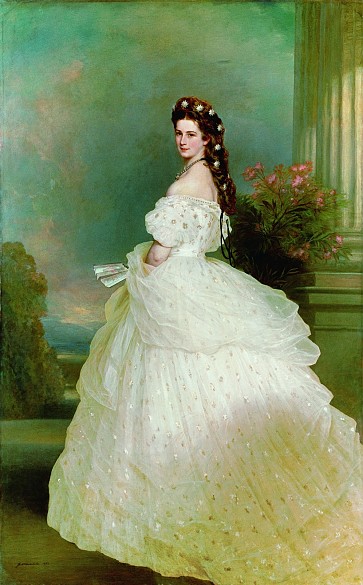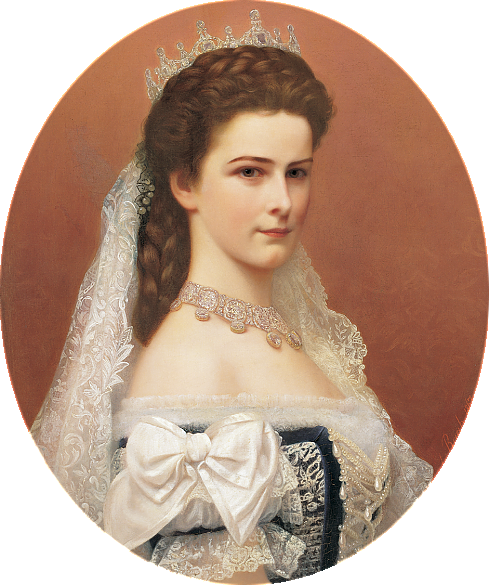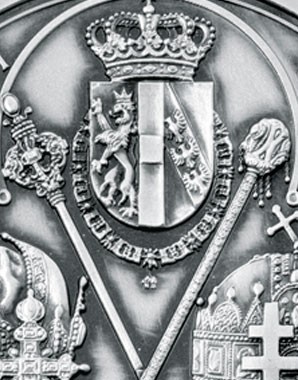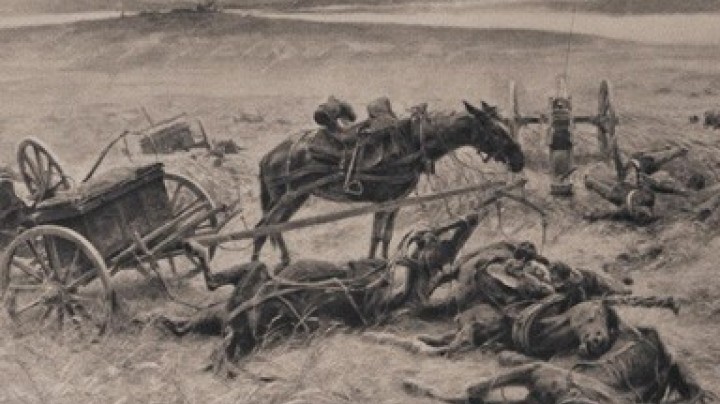Elisabeth’s transformation
In the third decade of her life Elisabeth’s personality underwent a remarkable transformation: the emperor’s shy, childlike bride became a confident and strong-willed woman who was determined to shape her life on her own terms.
Extract from a letter written by Franz Joseph to Elisabeth; source: Conte Corti, Egon Caesar: Elisabeth. Die seltsame Frau, Wien 1942, p. 163Even though you were very cruel and vexing, I love you so boundlessly that I cannot be without you.
After the first years of her marriage Elisabeth succumbed to a phase of resignation. Although she at first tried to fulfil the expectations that has been placed in her, she soon fell into a kind of passive resistance. The mysterious illness from which Elisabeth was reported to be suffering from 1859 can to some extent also be seen as her way of escaping the pressures that beset her. The young empress was able to ‘take a holiday’ from life at court and the domination of her mother-in-law in the form of extended stays at health spas. The nature of the relationship between the two women has been explored at length by biographers. The conflict was rooted in a completely different approach to the role of empress. The ambitious Sophie had deliberately foregone this position, sacrificing her personal happiness to the good of the dynasty. By contrast, Elisabeth had stumbled into the role, which was to remain alien to her for the rest of her life.
Elisabeth spent the winter of 1860/61 on Madeira recuperating physically and mentally. Six months later she was deemed to have been cured but postponed her return for another month in order to make a cruise on the Mediterranean, after which Franz Joseph urged her to come home. Soon after her return she had a relapse, prompting a four-month stay on Corfu. Franz Joseph again urged her to return, above all for the children’s sake. To encourage her he allowed Gisela and Rudolf to be taken to Venice, where they were reunited with their mother again after this lengthy separation.
When Elisabeth returned to Vienna in 1861 all at court were greatly surprised to see that she had turned into a self-confident young woman. She began to demand her own space, ensuring for example that she and her husband had separate bedrooms, which was an unusual arrangement for married couples at the Viennese court.
Having been described as pretty but also shy and childlike when she married the emperor, the empress was now also developing into a great beauty. Franz Joseph’s love for his wife grew ever stronger, but his affection was not returned to the same degree by Elisabeth. Nonetheless, the relationship between the two was marked by great trust and respect. Elisabeth was also adept at using her husband’s idolization of her to her own advantage.
Another turning point in Elisabeth’s attempts at achieving a degree of independence came in 1865 with her ultimatum to Franz Joseph concerning the upbringing of her son Rudolf. Elisabeth threatened to leave her husband if the rigorous military drill to which her son was being subjected and which was negatively affecting the child’s sensitive nature was not ended immediately. Her ultimatum accepted, she ensured that Rudolf received an upbringing and education based on liberal middle-class principles, which caused a sensation at the Viennese court.
It was also during this time that Elisabeth’s only political ambitions came to the fore, in her fervid support for the project of the Compromise with Hungary that was eventually realized in 1866/67. Elisabeth was to retain an enthusiasm for the language and culture of Hungary all her life. She admired the Hungarians’ struggle for independence, and her lively interest in Hungarian affairs made her very popular there. She had an intimate friendship with the later Hungarian Prime Minister Gyula Andrássy which is often painted as a romantic relationship; however, this is regarded as highly unlikely.
The birth of Elisabeth’s youngest daughter Marie Valerie, who was born in 1868, ten years after Rudolf, was connected with the empress’s enthusiasm for all things Hungarian. Known as the ‘Hungarian child’, Marie Valerie was brought up with Hungarian as her first language, dearly loved and idolized by Elisabeth. The empress was now able to live out her role as mother unopposed.
















